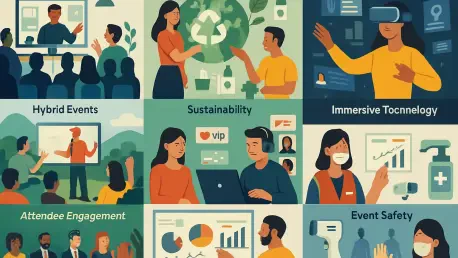The events industry, a powerhouse of economic activity, contributes billions annually to global markets through job creation, tourism, and business innovation. Imagine a sector so vital that a single major conference can inject millions into a local economy overnight, yet as 2025 unfolds, challenges like technological disruption and sustainability demands loom large, raising questions about how this dynamic industry will adapt. This market analysis dives into the forces shaping the events sector, spotlighting The Business of Events (TBOE) Global Policy Forum, slated for July 7, 2026, at IET London: Savoy Place. By examining current trends, partnerships, and policy influences, this exploration aims to uncover actionable insights for stakeholders navigating an ever-evolving landscape, highlighting why platforms like TBOE’s forum are critical for forecasting growth.
Market Dynamics: Unpacking Trends and Data in the Events Sector
Economic Impact and Growth Metrics
The events industry remains a cornerstone of global economic progress, with projections estimating steady growth from 2025 to 2027, driven by increasing demand for corporate gatherings, exhibitions, and cultural festivals. Data suggests that business events alone account for a significant portion of travel and tourism revenue, with destinations competing fiercely to host international conferences. However, inflationary pressures and geopolitical uncertainties pose risks to budgets and attendance, creating a need for cost-effective strategies. The sector’s resilience lies in its adaptability, as seen in the rapid pivot to hybrid formats post-pandemic, blending physical and digital experiences to maximize reach.
Technological Shifts Reshaping Engagement
Technology stands as a transformative force, with innovations like AI-driven event planning tools and virtual reality platforms redefining how attendees interact. Adoption rates for digital solutions have surged in 2025, enabling organizers to personalize experiences and analyze real-time data for better decision-making. Yet, the digital divide remains a hurdle, particularly for smaller markets lacking infrastructure to support advanced tech. Balancing investment in cutting-edge tools with accessibility will be crucial as the industry moves toward a future where seamless integration of online and offline events becomes the norm.
Sustainability as a Market Differentiator
Environmental concerns are no longer optional but a defining factor in event planning, with stakeholders prioritizing green practices to meet regulatory and consumer expectations. From reducing carbon footprints through virtual attendance options to sourcing local, sustainable materials for venues, the push for eco-friendly events is reshaping operational models. Market analysis indicates that organizations adopting these practices gain a competitive edge, appealing to environmentally conscious clients. However, high upfront costs for sustainable initiatives can deter smaller players, highlighting a gap that industry leaders must address through shared resources or incentives.
Policy and Partnerships: Catalysts for Industry Evolution
Strategic Alliances Fueling Market Influence
Collaboration emerges as a linchpin for amplifying the events sector’s voice, with TBOE’s 2026 Forum poised to unite around 300 senior leaders from diverse fields like venues, agencies, and trade bodies. The newly launched Partnership Prospectus offers tiers from Headline Sponsor to Forum Supporter, providing benefits such as branding on policy documents and access to high-level networking. These alliances not only boost visibility but also enable collective advocacy, though challenges persist in ensuring smaller entities can participate without being overshadowed by larger sponsors.
Policy Engagement Driving Regulatory Frameworks
Direct dialogue with policymakers sets TBOE’s forum apart as a market influencer, creating opportunities to shape regulations that support industry growth. Events like the Westminster Dinner, held on the eve of the 2026 Forum, facilitate candid discussions between TBOE Partners and parliamentary figures, fostering trust and accelerating policy outcomes. The risk of stalled recommendations remains, but the potential for innovative frameworks—such as tax incentives for sustainable events—could redefine market dynamics if momentum is sustained through consistent follow-up.
Regional Variations Impacting Market Strategies
Diversity across regions and sectors adds complexity to the events market, with economic disparities and differing regulatory environments affecting how strategies are implemented. For instance, urban hubs with robust infrastructure often outpace rural areas in hosting large-scale events, while sectors like exhibitions face unique logistical challenges compared to corporate meetings. Addressing these variations requires tailored approaches, with platforms like TBOE’s forum serving as a unifying space to share best practices and align on common goals despite fragmented market conditions.
Future Projections: Navigating the Next Frontier
Emerging Technologies and Hybrid Models
Looking ahead to 2026 and beyond, the events industry is set to embrace a hybrid future where digital and physical formats coexist seamlessly. Projections indicate that AI and immersive technologies will further personalize attendee experiences, while data analytics will refine event ROI measurements. However, market players must navigate cybersecurity risks and ensure inclusivity as tech adoption accelerates. The role of forums like TBOE’s in disseminating knowledge about these tools will be pivotal for maintaining competitive parity across the sector.
Regulatory and Economic Shifts on the Horizon
Economic fluctuations and potential regulatory changes loom as key variables, with global market instability possibly impacting event budgets through 2027. Anticipated policy shifts, potentially influenced by TBOE-driven advocacy, could introduce new compliance standards or funding mechanisms to bolster the sector. Markets that proactively adapt to these changes—by aligning with policy recommendations or diversifying revenue streams—stand to gain, while others risk lagging behind. Tracking these developments through industry platforms remains essential for informed forecasting.
Sustainability as a Long-Term Investment
Sustainability is expected to solidify as a core market driver, with long-term projections pointing to stricter environmental mandates and greater consumer demand for green events. Investment in renewable energy for venues and carbon offset programs will likely become standard, reshaping cost structures but also opening new revenue avenues through eco-certifications. The challenge lies in scaling these efforts industry-wide, a topic likely to dominate discussions at the 2026 Forum as stakeholders seek collaborative solutions to balance profitability with planetary responsibility.
Reflecting on the Past: Strategic Pathways Forward
Reflecting on the analysis, the events industry stood at a critical juncture in 2025, grappling with technological, economic, and environmental forces that demanded strategic foresight. The examination of TBOE’s 2026 Global Policy Forum revealed its indispensable role as a nexus for collaboration and policy influence, bridging gaps between market players and decision-makers. Moving forward, stakeholders are encouraged to leverage partnerships for enhanced visibility, invest in hybrid event capabilities to stay competitive, and advocate for policies that prioritize sustainability and economic support. Engaging actively with platforms like TBOE offers a pathway to not only navigate challenges but also seize emerging opportunities, ensuring the sector’s continued growth in an increasingly complex global landscape.









